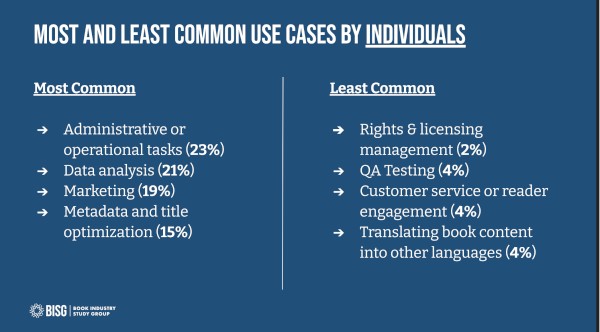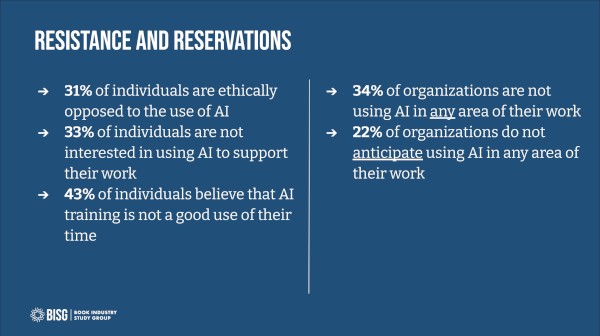AI Survey Results Are In
Book Industry Divided Over AI Adoption, Finds BISG Survey
Nearly half of book industry professionals are using artificial intelligence tools for work, but 98% report significant concerns about AI implementation, according to new survey data from the Book Industry Study Group released in September.
The survey, conducted this summer, covered 559 North American industry professionals, and included publishers, libraries, manufacturers, individual consultants, retailers, and service providers. It found that 46% of individuals and 48% of organizations reported using AI tools, while revealing various reservations and worries.
"The overwhelming majority reported multiple pain points with AI, including serious ethical concerns," Brooke Horn, BISG's membership and operations manager, said during a webinar presenting the findings. Only 2% of respondents reported having no concerns about AI use in the industry. "The majority of organizations that are using AI lack formal policies or guidelines, and many have yet to institutionally adopt closed and enterprise models to better protect their data."
"Inadequate controls around the use of copyrighted material" topped the list of concerns at 86%, followed by "hallucinations" at 84%, "AI-generated books flooding our platforms" at 81%, and "inaccurate, false, or biased training data" at 79%.
Horn said the data shows clear divisions between how individuals and organizations are approaching AI adoption. "We did see within that broader feedback that folks were saying, well, I as an individual may be opposed to using AI, but my organization is stipulating that this is part of our workflow now," Horn said. "And we've seen it the other way as well, where individuals are saying, I think that this makes it more efficient. I like using it for these reasons, but we're hearing that there's a policy against use of AI in the office."
Individual professionals reported using AI most commonly for operational and administrative tasks, data analysis, marketing, and metadata optimization. Organizations showed similar patterns, with editorial work appearing in the top four organizational uses.

The data also revealed significant resistance to AI adoption. Among individuals, the report said, 31% described themselves as ethically opposed to AI use, 33% expressed no interest in using AI for work support, and 43% believed AI training was not worthwhile.
"At the organizational level, 34% reported that they're not using AI in any area of their work whatsoever," Horn said. "Fully, 22% of folks said that they don't anticipate using AI in any area of their work. So that's a hard stop on any future adoption whatsoever."
The survey revealed notable differences in usage patterns. Horn said service providers and retailers are adopting AI at higher rates than publishers and libraries, with fewer pain points and more investment in custom tools.
"At the individual level, respondents working for service providers are knowingly using AI tools for work most, while individual operators such as consultants, freelancers, agents, indexers, and creators are using AI tools the least," Horn said. "Respondents working for libraries also voiced the strongest opposition to AI."
The survey highlighted significant gaps in organizational preparedness. Less than 30% of organizations reported having official AI policies, and only 27% are using closed or enterprise models for data protection.
"There may be a little bit of wiggle room with the numbers here based again on respondent understanding of what closed and enterprise models are and what their organization is using," Horn said. "But by and large, organizations have indicated that AI best practices would be helpful and the data and the responses shows that not only would they be helpful, but they're really needed."

The most requested areas for guidance included metadata, laws and regulations, editorial applications, ethics, and sales and marketing.
The survey identified several differences between U.S. and Canadian perspectives on AI adoption. While individual usage rates remained nearly identical between the two countries, organizational approaches diverged.
"Fewer Canadian organizations think that AI training is a good use of their time than organizations in the United States," Horn said. "A higher percentage of Canadian orgs discourage employee use of AI and actively avoid using AI tools than their US counterparts."
However, Canadian organizations showed higher adoption rates for marketing and customer service applications. Canadian respondents also expressed greater concern about sustainability reporting and consumer disclosure issues related to AI use.
"Canadian orgs consider AI's impact on sustainability reporting and lack of disclosure to consumers to be bigger pain points than their US counterparts," Horn said. "As far as statistical relevance goes, this was probably the biggest difference in data that we saw between US and Canadian answers."
Despite concerns, the survey found widespread experimentation across the industry. Among individuals managing work with AI, 45% reported experimenting with AI tools, 25% were seeking additional training, and 23% had incorporated AI into existing workflows.

"Regardless of whether they're using AI, 59% are staying informed and finding it important," Horn said.
The survey found limited use of AI for certain applications. Only 4% reported using AI for translation, while customer service applications remained surprisingly low across all segments.
"We had expected to see that showing up" in customer service, Horn said. "This was a big one that really stuck out at us as a key finding because the proliferation of customer service agents in other industries, we had expected to see that showing up here."
BISG plans to continue its AI webinar series and conduct deeper analysis of the survey data. The organization will also partner with BookNet Canada to publish a white paper on the results.
"There's many, many angles that we could take with this. It's a very robust data set, and this is just the preliminary findings," Horn said.
The survey's response rate ranked among the top three for BISG surveys in the past decade, indicating strong industry interest in AI guidance and policy development.
Horn said the working group's next meeting on October 7 will focus on deeper data analysis and review of hundreds of additional freeform comments from respondents.
"We don't want to just focus on those challenges," Horn said. "Those challenges mean that there are unique opportunities for the industry to really come together around these pain points because we all have them and work towards solutions at the front lines that will allow us to operate more efficiently, to keep getting books out into the world, but to protect our authors and our creators and our IP."